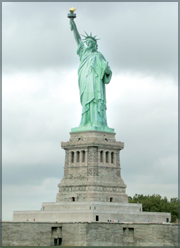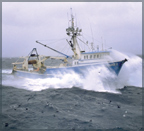|
|
|
And a terrifying ride through rough seas followed, surviving fierce storms, pirates hunting after, unending diets of fish and salty water and finally a rude awaking at gunpoint from Italian border patrol intercepting.
Pretending a change of course, they anchored at a distance. And, again, risking death in the dark, they tried to sneak into Italian shores amidst gunfire, and this time, swimming blindly towards a faint light on the shore.
He didn't know how many were able to escape, but he feels happy now. Given a shelter by some friendly Italian villagers, after a few weeks, he vanished into thin air. Another illegal economic migrant is looking for work.
But this is not always the case for the majority of would be illegal migrants. The penalties for failure is so devastating that thousands of them perish to death inside a container, at the back of a truck, failing to cope with rough seas or get shot dead when crossing a border. But the stream pours still, millions of men and women from the poor part of the world struggling for hire, risking their precious lives.
According to reports, human traffickers usually charge around a million in rupees from a would be traveller before get him on board in their rusty old ships. And, a capital of one million rupees suggests an adequate investment for a calculated venture. It's enough for a young energetic entrepreneur to embark on a project on his home soil and win.
Even though economic gains pose as the major attraction for migration, there are other factors that attract them too. It may be a peaceful environment, growing economy, health care, political stability and more opportunities for education that tempt them towards foreign shores.
|
|
When we put the rich world's wealth into context, people we would consider wealthy in the poor part of this world are materially worse off than poor people in the richer part of the world.
For that reason, even if the migrants live in penury in such a country, they are relatively richer than their compatriots back home. That is the most striking factor, which balances your thoughts when you are trying to make up your mind to risk your life on the most perilous journey of all.
But are they really happy and safe in their newfound havens? Their experiences at home and abroad could hardly be less similar. At home, finding enough to eat is a daily struggle, and a dull and routine clerical work in a government department is a lucky break. At abroad, they do not have to starve, but being an illegal migrant carries a sort of stigma. Where would they expect to be happier?
Even though hard up, you enjoy the respect that a decent citizen receives in all societies at home. You are with your compatriots and take part in all kinds of social interactions even under the toughest of conditions. Though outwardly happy, a migrant is well aware how locals see people like himself.
Officials representing migration department may be very impolite and harsh. Locals berate politicians for allowing you into their country. Their fears and sense of grievance that you are there to spoil their chances are unnerving.
In reality, the USA, Canada, Australia and New Zealand invited people with marketable skills even before globalization came into effect. They are countries that are built on immigration. Migrants were there on invitation and the land's extent and abundant resources ensured prosperity to the nation and to the self.
And, the common man accepted the idea that newcomers add to economic strength and cultural interest. But in Europe, Japan, Korea and Taiwan immigration is new and societies are less receptive to change. But, like it or not, such countries also offer ideal conditions for a hopeful immigrant - a life free of danger, corruption, and the hope for the children together with an immense earning potential.
Immigration in itself is a force of globalization. It is impossible to separate the globalization of trade and capital from the global movement of people. It is common knowledge that the market for top talent is global and competitive, and, as a result, developed countries redesigned their migration policies, not just to admit, but actively to attract highly skilled immigrants.
Like the USA, some other countries have already introduced green card systems of their own for information technology staff. But, proving that there is a scarcity, the required numbers of technology professionals are not turning up. In the richer part of the world, it is conventional wisdom to invite skilled people early. The skilled get the preference everywhere.
But unskilled also stands a good chance. In richer parts of the world, the electorate is wealthy and well educated, but the work force is aging. There are lots of jobs for the hard workers which the locals have little appetite. Therefore, the unskilled, our boat people, are not a big problem at lower levels of the service sector, shops, factories or in industrial labour.
Unskilled workers are welcome but they are a problem for the ordinary citizens, the voters. They know that immigration threatens their living standards, and, fear for their future as the flow of immigrants seems to be out of control.
The richer part of the world needs both the skilled and unskilled as well. On the one hand, top talent and competitive skills are vital to maintain a competitive edge with the increasing forces of globalization, and on the other, unskilled labour is indispensable for an aging economy where the countrymen hate work at the lower end of the skills spectrum.
So, those with marketable skills often leave the poor part of the world as soon as they graduate, and the unskilled is also looking for places where their labour is in demand.
According to a research paper, freeing migration is as powerful a measure towards wealth, as freeing trade. There are millions of jobs for unskilled workers in the rich world. But, if a migrant is there to stay, the voters consider them as disruptive elements.
Like us, they also get annoyed at odd languages, strange smells, clothing, cultures, etc. The social transformation that immigrants create generates a lot of resentment in the minds of the voters.
The customs, foods, ideas and new ways of doing things may easily be looked down upon. As a result, immigration meets confrontations from voters in the rich world. So there would be political costs for governments, which are in favour of letting in professional talent and cheap labour to their countries.
For them, if the labour-intensive levels of the service sector are function smoothly, they need millions of migrants as workers. For example, when law enforcement authorities' press on employers, they simply inform them that without illegal migrants their outputs would perish in the end.
So in complying with such economic forces at work, employers rarely corporate with the law enforcement authorities to curb illegal immigrants. The demand is so high, and the supply should be constant if the economy is to grow. It is difficult to control.
So with the blessings of the employers, borders will always leak, as they want more staff. And, in the richer parts of the world, it is their own economic needs that undermine their own restrictions on illegal migrants. Apart from such favourable situations abroad, the fall in transport costs is also making it cheaper to risk a trip, and cheap communication also inform would be immigrants of the jobs available.
So the government could help the boat people who want to provide just-in-time labour in the richer part of the world. They must be informed that there are enough opportunities available to migrate as a legal migrant.
Western governments are not that harsh on economic migrants now. There are programmes to inform the voters that migration is under control, they would be easily integrated into their cultures. And, all the immigrants are not there to stay. They would come back after a desired period. Governments are ready to exploit the flexibility and employability that economic migrants contribute.
Would be migrants should be informed that they stand a definite chance if they can prove that they can integrate smoothly into the new cultures. So they would think twice before risking their lives at borders and seas while trying to cross over to the USA, in the Indian Ocean down under, in the rough seas of Mediterranean or in the jails of Japan or Korea.
..................................











